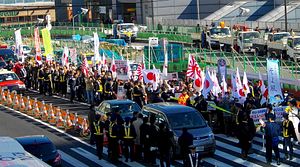While hate speech rallies in Japan may have faded from the headlines compared to a year or two ago, xenophobia is unfortunately still prevalent in Japan – as demonstrated by a recent rush of Japanese citizens eager to turn in their “illegal” Korean neighbors. It is not clear yet whether the source of this frenzy, an Internet rumor, was started by an innocent error or the willful intent to do harm, but what is clear is that it has yet again exposed the ugly side of Japanese exceptionalism.
The rumor that Zainichi ethnic Koreans with “special permanent resident” status are subject to deportation as of July 9 led to a surge in calls, letters, and emails from ordinary Japanese turning in ethnic Koreans who actually have – and will continue to have – legal residency in Japan. The rumor seems to come, in part, from confusion over the July 8 deadline for permanent residents to switch from alien registration cards to new residence cards. Though a penalty could be imposed for missing the deadline, it does not lead to a loss of one’s special permanent resident status.
The situation had become “serious” enough for the Justice Ministry’s Immigration Bureau to post an “important advisory” on its website on July 16 that missing the July 8 deadline for making the switch would not lead to deportation of such special permanent residents.
However, Yasuko Morooka, a lawyer focused on human rights of foreigners, believes more needs to be done by the government to clarify that the rumors are groundless. As she told Asahi Shimbun, “The ongoing problem of hate speech [against Koreans in Japan] appears to have moved into a new dimension since many people did take the action of reporting people to the Immigration Bureau. The incident shows that it could escalate into a crime or hate crime against specific racial or ethnic groups.”
Racial discrimination against Korean and Chinese residents in Japan has a long history, beginning with the aftermath of the 1923 Great Kanto Earthquake. After the earthquake, incensed by rumors that “Koreans are poisoning the wells” and “Koreans will attack us,” Japanese vigilantes murdered thousands of Koreans and hundreds of Chinese. Social media makes the spread of such rumors even more pernicious in the modern day – as exemplified by the reaction to the deadly mudslides in Hiroshima prefecture last August.
In response to increasing activities by the right-wing groups such as Zaitokukai (“citizens against special privileges for Zainichi Koreans”), international pressure has been building against the Japanese government’s feeble response. The UN Human Rights Committee released a report last July that called on the Japanese government to ban hate speech. The report expressed concern about remarks hostile to Korean, Chinese, and other foreign residents in Japan that could foster hatred and discrimination. This February, Amnesty International criticized Japan for not introducing legislation that bans hate speech in accordance with international standards. The U.S. State Department’s Country Reports on Human Rights Practices for 2014 noted “entrenched societal discrimination” against “the country’s Chinese, Korean, Brazilian, and Filipino permanent residents and discussed recent hate speech incidents in Japan. (Also read Freedom House’s 2014 Report on Japan here.)
While much more needs to be done, there have been some positive developments that should also be noted, with the court system leading the way in recognizing the suffering of victims. Last December, the Supreme Court upheld lower court rulings that ordered Zaitokukai to pay compensation for racist “hate speech” directed towards ethnic Koreans, including children, in Kyoto. The Kyoto District Court found in October 2013 that Zaitokukai’s speech contravened the International Convention on the Elimination of All Forms of Racial Discrimination, and in upholding that decision, the Osaka High Court stated: “The innocent students at the school were exposed to vulgar attack based solely on their ethnic origin and suffered major psychological damage through the irrational acts of racial discrimination.”
Civil society is also beginning to take a stand. For example, Ryang Yong Song and his Korean and Japanese allies have created the Anti Racism Information Center – a website where ethnic Koreans suffering racial abuse can report their grievances and receive help. The information gathered from the site is intended to help craft legislation to address such racism.
The government is also launching its own nationwide investigation into the problem of hate speech. Chief Cabinet Secretary Yoshihide Suga announced at a news conference on July 2, “We should carry out a full-scale investigation to find out how many cases of hate speech occurred and what is at issue.”
With Japan hosting the Group of Seven (G7) summit next year and the 2020 Summer Olympics, the national government needs to get its act together – but as usual, it seems that local units will be leading the way. This spring, Osaka Mayor Toru Hashimoto declared that he hopes to have an ordinance passed to crack down on hate speech within the year. Osaka could become a role model for other Japanese cities.
While a genuine change of heart by the 10,000 or so members of Zaitokukai would be ideal, it’s more realistic to hope that international pressure can change the most egregious instances of their discriminatory behavior. All humans deserve to be treated with dignity and respect, regardless of their legal status or racial/ethnic background. If Japan wants to maintain its standing in the world, it ought to ensure that such dignity is afforded to every individual that resides within its borders.

































